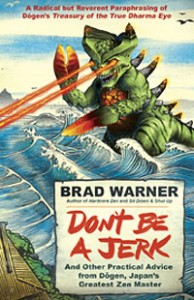FIVE THINGS I LEARNED FROM DOGEN

Article based on the book Don’t Be a Jerk ©2016 by Brad Warner. Published with permission of New World Library. http://www.newworldlibrary.com
By Brad Warner, author of Don’t Be a Jerk
I discovered the 13th Century Japanese Zen Master Eihei Do-gen when I was an 18 year-old punk rock bass player. Now I’m a waaaayyy-more-than 18 year-old punk rock bass player and I’m still trying to understand his philosophy and practice.
Do-gen is unusual in the realm of Zen Buddhist thinkers in that he wrote his own stuff and he was pretty young when he did so. Mostly when you read ancient Zen philosophy, you’re not only reading the words of a very old person, but you’re reading those words as interpreted by their students since few of the old Zen Masters (male and female, see below) were writers.
Do-gen was a writer and what’s more, he started writing very early in his career. Most of his writing was done when he was in his 30s and 40s. He became a monk when he was just 12. So while he’s very wise, he’s also young and fired up and often kind of ornery. Just the kind of thing a punk rock kid like me needed.
But Do-gen wrote 800 years ago in a time and a place very unlike ours. So he’s not that easy to understand. Still, if you work with him, and if you do the meditation practice he keeps recommending, it gets a little easier.
Here are a few things I learned from Mr. Do-gen.
- Sit Down and Shut Up — Do-gen taught a style of meditation called Shikantaza, which means, “just sitting.” It’s meditation without any goal. You’re not trying to become more balanced or more in touch with yourself or more mindful. You’re just sitting with yourself exactly as you are. On one hand it’s dirt simple. You can learn all there is to know about the technique in a couple of minutes. But you can spend a lifetime on it and never exhaust what you can learn from it.
- Don’t Be a Jerk —There’s a misconception that Zen is all about self-improvement and has nothing to do with ethics. But Do-gen says that the very essence of the practice can be summed up as “Don’t be a jerk.” Actually, that’s my paraphrase. In the original it’s more like, “Just avoid doing wrong.” Ethics isn’t about memorizing a set of supposedly universal moral standards because every situation is a little different. No set of rules can ever cover every situation. It’s about sitting down and shutting up and allowing what the Old Testament called the “still small voice” we all possess show you what the right action is in this specific situation.
- Keep Your Bum Clean — When people translate Do-gen, they generally choose the juicy philosophical parts. But Do-gen also wrote some very nuts-and-bolts pieces about how to practice in a Zen monastery. My favorite of these pieces is the one in which he gives extremely detailed instructions about how monks should clean themselves after using the toilet. It’s really TMI! But Do-gen’s teaching isn’t just about high-minded philosophical ideals. It’s about every little thing you do. It’s what my teacher called a “philosophy of action.” It’s not a philosophy you read and memorize. It’s a philosophy you do.
- Women and Men Are Both Just as Stupid — In the year 1240 CE, Do-gen wrote a sermon called Prostrating to That Which Has Attained the Marrow. You wouldn’t guess from the title, but the sermon is mostly about how men and women should be regarded as absolutely equal when it comes to their capacity to understand the deepest truths of life. In Japan in the 13th Century that was revolutionary.
Remember that women couldn’t even vote in the USA until 1920. In Japan in Do-gen’s day the spiritual inequality of women was taken for granted. There were temples that all women, including Buddhist nuns, were forbidden to enter that any man could walk into any time he pleased. Do-gen denounced that practice in no uncertain terms and went on to say that anyone who held the view that men are superior to women is an idiot. I already believed that before I read Do-gen, but it was amazing and inspiring to read words like that from a man who lived when he did.
- You Are Not Your Self and Neither Am I — The Buddhist idea that the self is an illusion is one of the trickiest aspects of the philosophy. You can tell me the Loch Ness Monster and the Easter Bunny aren’t real, but if you say that my self is unreal that just sounds crazy. I know I have a self because here I am!
But Do-gen isn’t saying that all those things you include within the concept of “self” are unreal. You have a personality and an individual history, you have your credit cards and I can’t use them, that’s all true. It’s just that when we combine this stuff into something called “self” — and then believe that this “self” we have created is a real thing — that’s when we get into trouble.
We waste our time, energy and effort building up something that doesn’t even exist. Then we defend this imaginary concept against imaginary attacks. We hold this “self” — that doesn’t even exist except in our minds — to be the single most important thing in all the world. And because of that, we suffer.
It takes more to get past this than simply acknowledging that we understand the self to be unreal. But that’s a very good first step. I know it’s made my life a whole lot better.
# # #
 Brad Warner is the author of Don’t Be a Jerk and numerous other titles including Sit Down & Shut Up, Hardcore Zen, and Zen Wrapped in Karma Dipped in Chocolate. A Soto Zen priest, he is a punk bassist, filmmaker, Japanese-monster-movie marketer, and popular blogger based in Los Angeles. Visit him online at www.hardcorezen.info.
Brad Warner is the author of Don’t Be a Jerk and numerous other titles including Sit Down & Shut Up, Hardcore Zen, and Zen Wrapped in Karma Dipped in Chocolate. A Soto Zen priest, he is a punk bassist, filmmaker, Japanese-monster-movie marketer, and popular blogger based in Los Angeles. Visit him online at www.hardcorezen.info.
Based on the book Don’t Be a Jerk ©2016 by Brad Warner. Published with permission of New World Library. http://www.newworldlibrary.com















 I’m sure you have heard this less than eloquent phrase before – “Garbage in, garbage out.” The phrase is typically used in computer programming and scientific research. Unfortunately, it also applies to the law, legal documents, and writing your own Will.
I’m sure you have heard this less than eloquent phrase before – “Garbage in, garbage out.” The phrase is typically used in computer programming and scientific research. Unfortunately, it also applies to the law, legal documents, and writing your own Will.  Most people who amass wealth do not do it so that their heirs can squander it. However, that is what happens in most cases. One way to help prevent this from happening to your wealth is to leave your family with an intellectual inheritance.
Most people who amass wealth do not do it so that their heirs can squander it. However, that is what happens in most cases. One way to help prevent this from happening to your wealth is to leave your family with an intellectual inheritance.  The most common estate planning mistake may surprise you. “The mistake actually isn’t part of the will and trust,” said Dan Prebish, head of life services events at Wells Fargo Advisors, based in St. Louis. “It actually has to do with beneficiary designation.”
The most common estate planning mistake may surprise you. “The mistake actually isn’t part of the will and trust,” said Dan Prebish, head of life services events at Wells Fargo Advisors, based in St. Louis. “It actually has to do with beneficiary designation.”